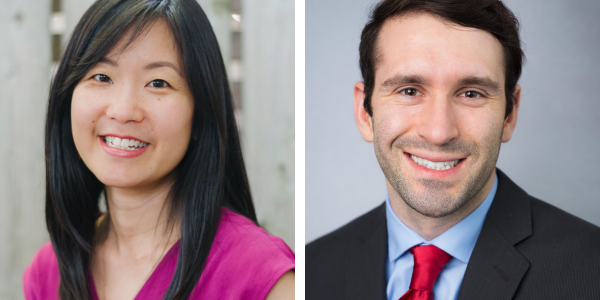Daphne Tan and Kevin Golovin recognized with Early Career Supervision Award

Daphne Tan (L) and Kevin Golovin (R), recipients of the 2023 Early Career Supervision Award
Assistant professors Daphne Tan (Faculty of Music) and Kevin Golovin (Department of Mechanical & Industrial Engineering) have been recognized with the 2023 Early Career Supervision Award.
The award, given annually by the School of Graduate Studies, aims to recognize pre-tenure faculty at the University who have, within the first 6 years of their graduate faculty appointment, demonstrated excellence in graduate supervision. Two awards are offered every year: one for the Humanities/Social Sciences and one for the Physical/Life Sciences.
“A supportive supervisor can make a world of difference to a graduate student’s trajectory,” says Joshua Barker, Dean of the School of Graduate Studies and Vice-Provost, Graduate Research and Education. “With this award, we want to recognize early-career faculty who have gone above and beyond in their supervisory duties.”
Winners of the Early Career Supervision Award receive an SGS conference or travel grant to award to a student and a framed certificate of recognition.
Prof. Daphne Tan, Faculty of Music
“I am really touched to be recognized in this way,” notes Tan, who is an assistant professor of music theory. “Working with graduate students is one of the happiest parts of my job, so this is really just icing on the cake.”
Tan, who holds bachelor’s and master’s degrees from McGill University and a doctorate from the Eastman School of Music at the University of Rochester, joined the University of Toronto in 2017. Her research explores questions related to music and the mind, using methodologies and perspectives from the history of music theory and cognitive science. She has published a dozen refereed journal articles and book chapters—several co-authored with students—and she is the editor and co-translator of Ernst Kurth’s Music Psychology, the first English-language translation of this influential monograph.
For her work on the intersections of music theory and psychology in the early twentieth century, she received an Emerging Scholar Award (Article) from the Society for Music Theory and the David Kraehenbuehl Prize from the Journal of Music Theory.
Since joining U of T, Tan has supervised four doctoral theses (two were completed in December 2022) and co-supervised a fifth, supervised seven master’s independent projects, and served as an advisory committee member on nine doctoral theses. She has also served as an arm’s-length examiner for numerous master’s and doctoral theses.
“Graduate supervision is the best part of this job,” says Tan, who originally wanted to pursue a career as a professional clarinet player. “The students I work with are very talented, and they come with their own skillsets and perspectives. I always learn from them in some way.”
In her supervision, Tan takes into account each student’s unique circumstances. “It can be tempting to assume you know what’s going on with somebody or to take your own personal experience and map that onto somebody else,” she says. “But each person is a different individual, and it’s important to be aware of what their particular strengths and challenges might be.”
She also strives to provide structure for her students as they progress through their degree and invites them to tell her what kind of feedback would be most useful when they’re working on their writing.
“Dr. Tan skillfully tailored our meetings to suit my individual learning and working styles,” wrote one student. “She supported my desire for efficient, goal-oriented productivity by providing a balance between structured guidance and trusting independence.”
Another student noted that “Professor Tan’s detail-oriented approach set a strong example for me to achieve the highest standard of care and precision in my research.”
Prof. Kevin Golovin, Department of Mechanical & Industrial Engineering (Faculty of Applied Science & Engineering)
“Supervision is my favourite part of the job,” says Golovin, who is currently supervising 10 PhD students, and 3 master’s students. “Just teaching my students how to think in a way that’s new and interesting, and teaching them to observe the things they see in a lab in a way that’s scientific.”
Golovin holds bachelor’s degree from Cornell University and a PhD from the University of Michigan and is the principal investigator of the Durable Repellent Advanced Engineering Materials (DREAM) Laboratory at U of T. Together with his group (whom he affectionately calls the DREAM Team), Golovin investigates coatings, surface modification, the mechanics of interfaces, and sustainable methods for achieving solid and liquid repellency. His current research interests include ice-phobic and ice-shedding coatings, the prevention of microplastic release, sustainable replacements for perfluorinated chemistries, and smart materials and coatings.
In 2020, he was named an Emerging Leader in Chemical Engineering by the Canadian Society of Chemistry.
Students from Golovin’s group have first-authored publications in prestigious journals like Nature Sustainability, Nature Communications, and Advanced Materials. Several have also presented at national and international conferences. (Golovin funds 100 % of all conference travel for his students, and many attend multiple conferences a year.)
Golovin’s students praise his commitment to creating an inclusive environment and his willingness to consistently support their professional development.
“Prof. Golovin is a strong proponent of fostering a research environment that upholds principles of equity, diversity, and inclusion,” wrote one student. “He takes deliberate efforts to create a supportive and respectful atmosphere for all students.”
“Prof. Golovin is not only an academic expert but is highly empathetic and supportive of our personal and financial needs,” attested another student. “To alleviate our financial concerns, he supports us with scholarships/ awards, which allows us to focus fully on academic pursuits with greater peace of mind.”
Golovin says his students are the heart of his lab. “Eventually, all the good ideas coming from your group are coming from your students and not yourself,” he says. “You can get pretty far for a few years, but eventually, it’s the students doing the thinking. So the atmosphere you create for them is going to be what drives your lab and not yourself.”
